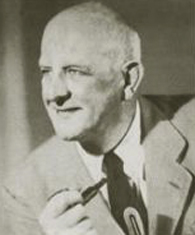 |
 |
|---|
P.G. Wodehouse: Jeevesian in Life; Woosterish in Berlin
(originally posted 2006; Updated Aug. 23, 2014)
How many readers of P. G. Wodehouse's delightful tales of Jeeves, Wooster, Mulliner, Featherstonehaugh-Ukridge ever wonder what the creator of these unforgettable characters was like? I suspect not many.
Wodehouse is the English language's greatest comic writer, however in his splendidly written tales of ineffectual and ineligible young men pursuing doll-like women or trying to swindle more money out of severe aunts, there is nothing that inspires the reader to wonder about him. There is no darkness, no anger, no--to use the contemporary term--agenda. When he was a celebrity--and in the late 1920s "Plum" was the bestselling author in England--he often pretended that he was a real-life Bertie Wooster. However he was anything but a fellow unacquainted with gainful employment.
In fact he was a workaholic. His lifetime output was many times greater than what is remembered or what survives in print. Pelham Grenville Wodehouse began writing in 1886 when he was five years old. He was still writing as a nonagenarian in 1975.
His parents lived overseas and left young Wodehouse in the care of blue-book relatives where he "met earls and butlers and younger sons in some profusion" and spent lonely days downstairs in the servants hall. At school, he was a straight-A student, fluent in Latin and Greek. He became a successful writer in his twenties by hunkering down and writing and writing and writing. For decades he commuted from England to the U.S. where, when he wasn't selling short stories and books at astronomical prices, he was helping Jerome Kern and the Gershwin Brothers develop the integral musical comedy. The song Bill was part of Wodehouse's contribution to Showboat.
Personally, he was a cheerful fellow whose hobbies were cricket and golf. He was indifferent to God, and, although married, indifferent to sex. His indifference also extended to war. That got him into big trouble in World War Two. A resident of France in May, 1940, he was trapped behind the German invasion. The Germans put him in a prison camp, but upon discovering who he was, they put him in hotels and country houses and allowed him to receive income from his writings. They also put him on the radio.
Broadcasting from Berlin, Wodehouse made an ass of himself, saying that the prison camp had been "great fun." His script was most likely a clumsy effort to tell the folks at home that he was keeping a stiff English upper lip. However what the folks heard was a traitorous, Edwardian schoolboy. Wodehouse's silly bitch of a wife, who acted as if the war had limited her shopping, didn't help.
Wodehouse emerged from captivity to eventual forgiveness. He was even knighted, but he had to live for decades more in a world where publishers wanted "heavy serious stuff about life in the swamps of Carolina and that sort of thing" rather than his storytelling that was unevolved from 1928.
The gathering mists of obscurity were dispelled in the very last years of Wodehouse's nine decades. Along came public television in the U.S. and with it a viewer demand for English period dramas and comedies. Plum's stuff was just the ticket. His last job was introducing the various Mulliners in Wodehouse Playhouse.
Robert McCrum's book Wodehouse: A Life is, typically of Brit biographies, for the reader who wants extensive detail of the subject.
 |
|---|
| Copyright 2014 by Neal J. Conway. All rights reserved. About this site and Neal J. Conway nealjconway.com: Faith and Culture Without The Baloney |